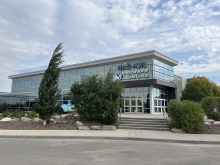Ever wonder what it’s like to have only half a brain, what it was like to be a Canadian in Afghanistan on Sept. 11, 2001, or to be gay in small town Alberta.
They’re all stories told by what the University of Alberta’s Augustana campus calls human books.
Staff, students and the public were recently able to borrow these human books, which means they were able to sit down and have conversations with people who agreed to offer themselves as human books.
Their stories represent common prejudices and stereotypes, said head librarian Nancy Goebel.
Read Also

Extreme rain increases as planet warms
In this issue, we are going to wrap up our look at extreme rainfall by examining the different weather patterns that tend to be associated with these rainfall events.
The goal of the Augustana Human Library is to help break down stereotypes and prejudices by listening to a person’s personal story, said Goebel, who has organized eight human library book events at the university.
“This is a safe place to ask questions.”
Goebel has acquired 85 human library books who have shared their stories of what it’s like to be gay, lesbian or transgender, blind, living with cancer, have a miscarriage, be an Afghan war vet, survive sexual abuse or grow up poor.
“It’s been amazing to see the breath of experience local people have and are willing to share.”
Ryan Burlingame of Whitehorse checked out Augustana professor Les Parsons, whose book title was The Greatest Risk in Life is to Not Risk at All. The Augustana student wanted to know how to develop a healthy attitude to risk in life.
“Knowing risk is key to developing as a person,” he said. “It’s way more interesting to talk rather than read about it.”
Maya Zimmermann had never checked out a human book before and wanted to learn a little more about Parsons, her cross-country ski instructor.
Unlike other Human Library Book projects, where readers talk to their books one at a time, at Augustana, the book is often shared by a group of readers to help readers ask the questions of their book.
Parsons said he is often accused of taking too many risks in his travels in third world countries.
For Parsons, these trips are an “educational opportunity” that more people should take.
“I want to try different things. It’s easy to follow the path of least resistance,” said Parsons, who challenged readers to take calculated risks or do something different occasionally.
It’s the third time Jason Peterson has volunteered to be a human book to let people know there is life after a brain tumor.
“I’m interested in the human book idea,” said Peterson, whose book was titled Memoirs of an Emptied Brain, the story of his life with a brain tumor.
“It’s not something you often talk about in general, or be super open about,” said Peterson, a biology instructor at Augustana.
Peterson discovered five years ago he had a brain tumor that had been slowly growing since he was two. Doctors discovered the tumor, about the size of a fist, when he collapsed on a street in Edmonton.
About 60 percent of the tumor was removed through surgery and Peterson has lived a relatively normal life since then, although he said he can hear his brain “sloshing” in the vacant space left by the tumor.
Despite the surgery, the tumor has continued to grow and Peterson must decide shortly if he wants to undertake radiation and chemotherapy treatment to try and kill the tumor, affectionately called Fred.
Peterson, who has four university degrees and a doctorate, hopes his book will help people recognize that a brain tumor doesn’t have to be life limiting.
“It doesn’t stop you from doing,” said Peterson.
Goebel said many human library book projects around the world deal with prejudices and stereotypes, but at Augustana the category of life experience was added to the human bookshelf.
The human library concept was developed by a Danish youth group as part of violence prevention program and has spread to libraries around the world.














